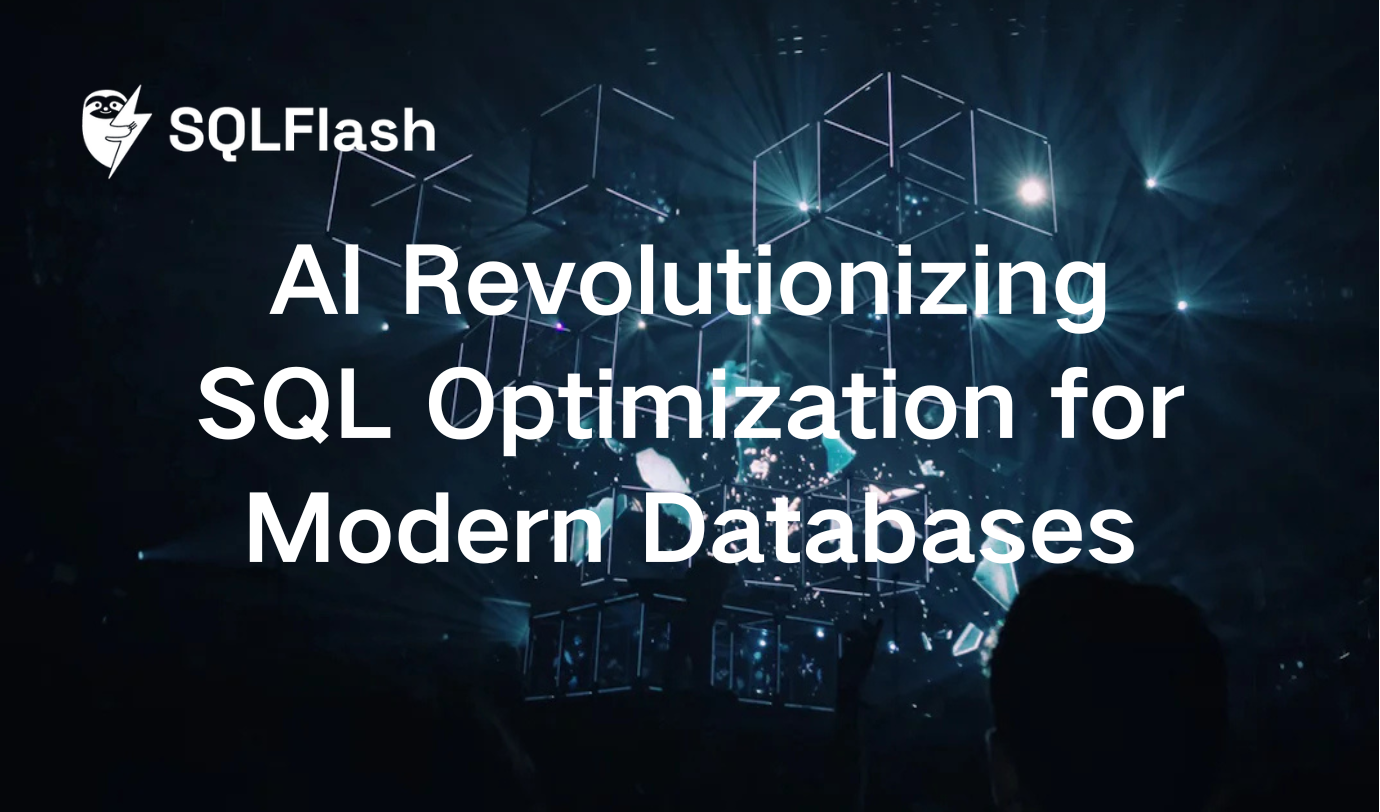AI Revolutionizing SQL Optimization for Modern Databases

Table of Contents

Image Source: unsplash
Modern databases demand efficiency and scalability, but SQL optimization often presents challenges. AI for SQL optimization transforms this process by automating tedious tasks and improving query performance. It identifies inefficiencies, adapts to workload changes, and enhances responsiveness. Machine learning analyzes historical data to optimize queries, reducing execution time and resource usage. Developers benefit from faster application development and improved scalability. AI also addresses large dataset management issues, ensuring accuracy and efficiency. These advancements make AI indispensable for modern database management, empowering you to achieve better performance with less effort.
Key Takeaways
AI makes SQL optimization automatic, speeding up database tasks easily.
Simple language tools let anyone write SQL without tech knowledge.
AI tools make queries run faster and use fewer resources.
Learning SQL is easier with AI, and fixing errors is quicker.
SQLFlash is a strong tool that improves databases instantly, saving money and time.
Understanding AI for SQL Optimization
The Role of AI in SQL
AI plays a transformative role in SQL optimization by addressing challenges that traditional methods struggle to overcome. It uses advanced techniques like machine learning and deep learning to analyze queries and find the most efficient execution plans. This approach improves database performance and reduces resource consumption. For example:
Machine learning can forecast query arrival times, increasing throughput by up to 180 times and reducing latency by 99% in PostgreSQL environments.
MySQL workloads benefit from a 5× improvement in throughput when indexes are adjusted hourly.
AI also identifies and eliminates unnecessary indexes that do not enhance performance. Tools like MCTS-based enumerators use reinforcement learning to explore large search spaces and find optimal configurations. Additionally, AI predicts potential query performance regressions using historical data, enabling proactive adjustments. These capabilities make AI for SQL optimization a game-changer for modern databases.
Natural Language Query Generation
Natural language query generation simplifies database interactions, especially for non-technical users. AI interprets plain language inputs and converts them into SQL syntax, eliminating the need to memorize complex commands. Tools like APEX AI Assistant and AI2SQL allow users to generate SQL queries using natural language prompts. This feature makes querying databases faster and more accessible.
The benefits of this technology are significant:
Accessibility: Anyone can query databases without SQL knowledge.
Time-saving: Queries that once took hours now take seconds.
Error reduction: AI ensures every query is syntactically correct.
Empowerment: Non-technical teams can make data-driven decisions independently.
By bridging the gap between technical and non-technical users, AI for SQL optimization fosters collaboration and enhances productivity. It empowers you to focus on insights rather than the complexities of query writing.
Enhancing Query Performance with AI

Image Source: unsplash
AI-Driven Query Optimization
AI-driven query optimization transforms how you manage database performance. It uses machine learning to analyze historical data and identify patterns that improve query execution. This approach ensures faster and more efficient database operations. For example:
A Fortune 500 CPG company reduced the number of queries run by 80% after adopting AI-based query optimization.
Machine learning algorithms dynamically rewrite queries, adapting to real-time conditions for better efficiency.
AI systems also create optimized execution plans by evaluating multiple possibilities. These plans reduce resource consumption and improve response times. By implementing AI for SQL optimization, you can achieve significant performance gains while minimizing manual intervention.
Resource Management and Cost Efficiency
AI optimizes resource allocation in databases, helping you reduce costs and improve efficiency. It minimizes waste by learning from past query executions and adjusting indexing strategies. This results in faster, more reliable databases that are easier to manage.
AI-powered systems monitor database health metrics in real-time. They predict potential failures and initiate preventive measures, which lowers maintenance costs. This proactive approach enhances reliability and ensures uninterrupted operations.
Additionally, AI for SQL optimization enables data-driven decisions. By analyzing resource usage patterns, it identifies areas for improvement and suggests cost-saving strategies. These capabilities make AI an essential tool for effective database management.
Tip: Leveraging AI for SQL optimization not only boosts performance but also ensures long-term cost savings.
Simplifying SQL for Non-Experts
AI Tools for SQL Learning
AI tools make learning SQL easier for beginners by simplifying complex concepts. These tools allow you to interact with databases using plain language instead of writing intricate SQL commands. For example, natural language query tools let you ask questions like, “What were the total sales last month?” The AI then converts your question into a proper SQL query.
Some of the most effective tools for learning SQL include:
AI 2 SQL: This tool generates SQL code from plain language prompts, helping you retrieve data effortlessly.
SimplyPut SQL Tools: It offers a free widget for debugging and optimizing SQL queries, making it ideal for beginners.
SQLAI: Similar to AI 2 SQL, this tool simplifies database interactions by creating SQL queries from user inputs.
These tools also provide automated query generation and data visualization. They suggest query improvements and display insights in easy-to-understand charts. By using these tools, you can focus on understanding data rather than struggling with syntax.
Debugging SQL with AI
AI-powered debugging tools help you identify and fix SQL errors quickly. These tools use natural language processing to interpret your queries and detect potential issues. For example, if you write a query with a syntax error, the AI highlights the problem and suggests corrections.
Automating SQL query generation reduces the chances of manual errors. You can rely on AI to create accurate queries, saving time and effort. Additionally, these tools provide quick insights by generating queries rapidly. This allows you to resolve errors and make decisions without delays.
AI debugging tools like SimplyPut SQL Tools enhance accuracy and efficiency. They ensure your queries run smoothly, even if you’re new to SQL. With these tools, you can debug like a pro and gain confidence in managing databases.
Tip: Start with beginner-friendly tools to build your SQL skills while leveraging the power of AI for SQL optimization.
Practical Applications of AI for SQL Optimization

Image Source: pexels
AI-Powered Query Generation Tools
AI-powered tools simplify query generation, making database interactions more intuitive. These tools allow you to create SQL queries using plain language, eliminating the need for advanced SQL knowledge. Here are some popular tools and their features:
| Tool Name | Features |
|---|---|
| SQLAI.ai | Query generation, optimization, and explanation capabilities. |
| AI2sql.io | Supports multiple databases and integrates with GPT-3. |
| SQLFlash | Your AI-powered SQL Optimization Partner. |
These tools empower you to interact with databases effortlessly. For example:
AI 2 SQL generates SQL code from plain language queries.
SQLAI interprets inputs to create accurate SQL commands.
SQLFlash Optimize your SQL syntax to improve query efficiency.
By using these tools, you can save time, reduce errors, and focus on analyzing data instead of writing complex queries.
Note: AI-powered query generation tools are ideal for both beginners and experienced users, enhancing productivity across skill levels.
Real-World Examples of Query Optimization
AI for SQL optimization has transformed query performance in real-world scenarios. It automates processes, reducing manual adjustments and speeding up execution. Here are some notable examples:
DeepSeek, an AI model, automates query optimization, improving execution times significantly.
Performance profiling has helped organizations achieve faster query responses.
Tools like dbgen simulate real-world workloads, ensuring practical and relevant optimizations.
These advancements demonstrate how AI enhances SQL performance tuning. By analyzing, optimizing, and testing queries efficiently, AI ensures databases operate at peak performance.
Tip: Leverage AI-driven tools to automate repetitive tasks and achieve consistent query optimization results.
AI for Query Explanation and Insights
AI-powered tools not only optimize queries but also explain them. These tools break down complex SQL statements, helping you understand their components and logic. For instance, AI2Sql includes a Data Insight Generator that formulates questions based on datasets. You can input SQL queries and receive detailed explanations, aiding in debugging and education.
AI assistants also provide actionable recommendations for fixing and optimizing queries. They act as a second set of eyes, ensuring your database runs smoothly. This reduces errors and boosts efficiency.
By offering insights and explanations, AI tools make SQL more accessible. Whether you’re troubleshooting or learning, these tools empower you to interact with databases confidently.
Callout: Use AI-driven query explanation tools to enhance your understanding of SQL and improve your database management skills.
SQLFlash
What is SQLFlash?
SQLFlash is an AI-powered tool designed to revolutionize SQL optimization. It combines advanced machine learning algorithms with database management to deliver faster, more efficient query performance. SQLFlash analyzes your database workload, identifies bottlenecks, and suggests improvements in real time. It works seamlessly with popular databases like MySQL and PostgreSQL, making it a versatile solution for modern database challenges.
This tool simplifies complex SQL tasks by automating query tuning and resource allocation. It also provides actionable insights to help you make data-driven decisions. Whether you’re a database administrator or a developer, SQLFlash empowers you to optimize your database with minimal effort.
Did you know? SQLFlash can reduce query execution time by up to 70%, ensuring your applications run smoothly.
What are the advantages of SQLFlash?
SQLFlash offers several benefits that enhance database performance and usability. Here are some key advantages:
Improved Query Performance: SQLFlash optimizes queries to reduce execution time and resource usage.
Real-Time Insights: It provides instant feedback on database health and performance metrics.
Ease of Use: The intuitive interface makes it accessible even for non-experts.
Cost Efficiency: By optimizing resource allocation, SQLFlash helps you save on infrastructure costs.
Scalability: It adapts to growing workloads, ensuring consistent performance as your database scales.
These features make SQLFlash an essential tool for anyone looking to streamline database operations.
Tip: Use SQLFlash to automate repetitive tasks and focus on strategic database management.
If you are using MySQL or PostgreSQL, how can you use SQLFlash?
SQLFlash integrates effortlessly with MySQL and PostgreSQL. Follow these steps to get started:
Install SQLFlash: Download the tool from the official website and install it on your system.
Connect Your Database: Use the provided interface to link SQLFlash with your MySQL or PostgreSQL database.
Run Analysis: Initiate a performance analysis to identify optimization opportunities.
Apply Recommendations: Review the suggested improvements and implement them with a single click.
Monitor Performance: Use the dashboard to track query performance and resource usage over time.
Pro Tip: Schedule regular analyses with SQLFlash to maintain peak database performance.
SQLFlash simplifies database management, making it a valuable asset for both beginners and experienced users. By leveraging its capabilities, you can achieve faster, more reliable databases with ease.
AI has revolutionized SQL optimization by automating complex tasks and improving database performance. It enhances query execution through automated indexing, adaptive plans, and anomaly detection. You benefit from faster, more efficient database operations and reduced manual effort.
Key Benefits of AI in SQL Optimization:
Performance: AI rewrites queries and adjusts execution plans dynamically.
Accessibility: Natural language tools simplify SQL for non-experts.
Learning: AI-powered tools help you debug and understand SQL better.
AI is addressing major SQL challenges, making databases more scalable and efficient.
Future advancements will further enhance SQL optimization. AI will anticipate bottlenecks, rewrite queries for efficiency, and adapt to real-time workloads. These innovations will empower you to manage databases effortlessly while achieving peak performance.
FAQ
What is SQL optimization, and why is it important?
SQL optimization improves the efficiency of database queries. It reduces execution time and resource usage. Optimized queries ensure faster data retrieval, better application performance, and lower costs. This process is essential for managing large datasets and maintaining scalable, high-performing databases.
How does AI improve SQL optimization?
AI analyzes historical data and query patterns to create efficient execution plans. It automates indexing, rewrites queries, and predicts performance issues. These capabilities reduce manual effort and improve database speed and reliability. AI ensures your database adapts to workload changes in real time.
Can non-technical users benefit from AI-powered SQL tools?
Yes, AI-powered tools like SQLFlash simplify SQL for non-technical users. They convert natural language inputs into SQL queries. These tools make database interactions accessible, allowing you to retrieve data, generate insights, and make decisions without needing advanced SQL knowledge.
How does SQLFlash differ from other AI tools?
SQLFlash focuses on real-time query optimization and resource management. It integrates seamlessly with MySQL and PostgreSQL. Its intuitive interface, real-time insights, and scalability make it a versatile solution for both beginners and experts. SQLFlash also reduces query execution time by up to 70%.
Is SQLFlash suitable for small businesses?
Yes, SQLFlash works well for small businesses. It optimizes database performance, reduces costs, and simplifies management. Its user-friendly design ensures accessibility for teams with limited technical expertise. SQLFlash scales with your business, adapting to growing workloads effortlessly.
Tip: Start with SQLFlash to experience faster, more efficient database operations without needing advanced SQL skills.